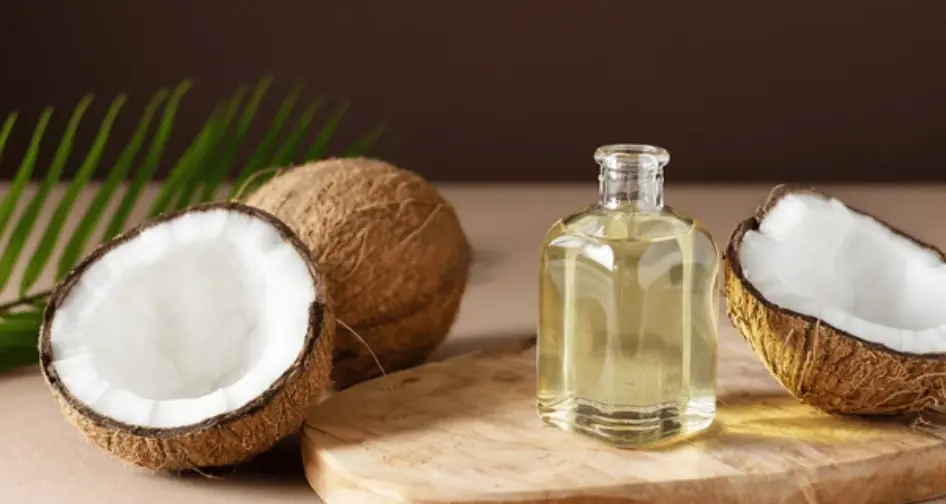Introduction
Coconut oil has emerged as one of the most famous natural hair care products in recent years, and for the right purpose. This flexible oil, extracted from the beef of coconuts, offers more than a few capability advantages for hair fitness, which have captured the attention of beauty enthusiasts and researchers alike. While coconut oil has been used traditionally for hair care in lots of cultures for hundreds of years, contemporary-day technology is now validating lots of its claimed benefits at the same time as also revealing critical concerns for its use.
Understanding Coconut Oil: The Science Behind Its Hair Benefits
Coconut oil’s effectiveness for hair care stems from its precise molecular composition. Unlike many different oils utilized in hair care, coconut oil consists normally of saturated fatty acids, with lauric acid making up about 47% of its fatty acid content. This composition offers coconut oil numerous distinct properties that make it specifically useful for hair fitness.
The molecular shape of coconut oil is what sets it apart from other hair oils. Research has shown that coconut oil has a low molecular weight and an immediately linear chain shape, which permits it to penetrate deep into the hair shaft. This penetration potential is important as it approaches coconut oil, which can work from inside the hair fiber, in the region of virtually coating the surface, like many other oils.
The Penetration Advantage
Scientific research has shown that coconut oil’s specific capacity to penetrate hair fibers offers it a massive advantage over other generally used oils. In a complete take a look at evaluating coconut oil, mineral oil, and sunflower oil, researchers discovered that coconut oil turned out to be the most effective oil that appreciably reduced protein loss from hair when used both as a pre-wash and post-wash treatment. This advanced overall performance is attributed to coconut oil’s triglyceride structure of lauric acid, which has an excessive affinity for hair proteins.
Key Benefits of Coconut Oil for Hair Health
Moisture Retention and Hydration
One of the number one benefits of coconut oil for hair is its fantastic moisturizing properties. The oil enables lock-in moisture by forming a defensive coating over the hair shaft, which seals the cuticle and traps moisture inside. This emollient motion is mainly beneficial for individuals with dry, brittle, or damaged hair.
Clinical studies have confirmed that coconut oil can appreciably improve scalp hydration and decrease water absorption through the use of hair fibers. By reducing the amount of water that hair absorbs, coconut oil helps restrict ordinary damage that takes place while hair swells and contracts with moisture changes. This shielding effect contributes to stronger, more resilient hair through the years.
Protein Loss Prevention
Perhaps one of the most scientifically documented benefits of coconut oil is its ability to prevent protein loss from hair. Hair is regularly composed of a protein called keratin, and different factors, which include washing, chemical treatments, warm temperature styling, and environmental exposure, can harm this protein structure.
Research has continuously shown that coconut oil is more effective than other oils in stopping protein loss. A landmark observation determined that coconut oil decreased protein loss in each broken and undamaged hair; mineral oil and sunflower oil confirmed no such protective effects. This protein upkeep is vital for retaining hair energy, elasticity, and everyday health.
Reducing Hair Breakage and Split Ends
The combination of moisture retention and protein protection makes coconut oil notably powerful at lowering hair breakage. Studies have proven that coconut oil can lessen hair breakage by up to 41.8%. This giant reduction in breakage takes place because properly moisturized hair with intact protein structures is more flexible and less at risk of snapping even when subjected to mechanical stress from brushing, styling, or everyday handling.
For people managing split ends, coconut oil can assist in restoring damage and prevent new split ends from forming. The oil’s capability to penetrate the hair shaft allows it to work at the internal structure of broken hair, helping to clean and seal split cuticles.
Antimicrobial and Antifungal Properties
Coconut oil possesses herbal antimicrobial and antifungal properties, broadly speaking, due to its high concentration of lauric acid and monolaurin. These compounds are powerful in competition with numerous microorganisms and fungi that can affect scalp health. The oil has verified bactericidal activity against numerous dangerous microorganisms, such as Propionibacterium acnes, Staphylococcus aureus, and Escherichia coli.
Dandruff Reduction and Scalp Health
The antimicrobial properties of coconut oil make it useful for addressing dandruff and maintaining average scalp health. Research has indicated that coconut oil has the functionality to provide antifungal advantages to people with dandruff. The oil’s potential to manipulate sebum manufacturing and reduce infection can help limit the conditions that contribute to dandruff formation.
Additionally, coconut oil’s moisturizing properties assist in fighting dry scalp conditions that can lead to flaking and inflammation. By preserving the right scalp hydration, coconut oil facilitates a healthy environment for hair growth.
Hair Growth Support
While direct evidence for coconut oil selling quicker hair booms is constrained, the oil helps situations that promote healthy hair growth. By enhancing scalp fitness, reducing irritation, and preventing hair breakage, coconut oil creates an environment in which hair can develop to its complete potential. Some studies have suggested that the fatty acids in coconut oil may also help improve blood flow to the scalp, which can assist the delivery of nutrients to hair follicles.
Research using animal fashions has established promising effects for hair boom acceleration while coconut oil is applied in combination with distinct natural additives. One take a look at discovered that an aggregate containing 80% coconut oil and 20% candlenut oil was best in stimulating hair improvement in check subjects.
How Coconut Oil Works: The Molecular Mechanism
Understanding how coconut oil works at the molecular level provides a reason behind its effectiveness. When applied to hair, coconut oil’s small molecules can penetrate through the cuticle layer and into the cortex of the hair shaft. This penetration lets the oil interact immediately with the hair’s protein form, filling gaps and strengthening the fiber from the inside.
Recent research has discovered that coconut oil and other distinctive, useful oils efficiently diffuse and interact with the cortical layer of hair fibers. The effect on hair’s mechanical properties depends on the extent of contemporary harm and environmental conditions. In virgin (undamaged) hair, coconut oil enables beefing up the hydrophobic barrier of the mobile membrane, preventing water from causing mechanical strain.
Temperature and Penetration
Coconut oil’s melting point of approximately seventy-eight degrees Fahrenheit (24 degrees Celsius) makes it especially appropriate for hair treatments. When warmed barely, the oil will become liquid and spread without trouble via hair; however, it solidifies at cooler temperatures, which could assist in locking in its benefits.
Important Considerations and Potential Drawbacks
Hair Type Compatibility
While coconut oil gives many benefits, it is not appropriate for all hair types. Individuals with extremely good, low-porosity hair might also discover that coconut oil weighs down their hair or makes it appear greasy. The oil needs to, by no means, be used on dry, coarse, or brittle hair types, which might be especially prone to breakage, as immoderate use can paradoxically grow brittleness.
Protein Overload Risk
One important consideration is the danger of protein overload. Because coconut oil penetrates so deeply into the hair shaft, immoderate use can bring about a buildup of proteins within the hair fiber. This protein accumulation can, without a doubt, make hair extra brittle and liable to breakage, particularly if the hair is already protein-sensitive.
Follicle Clogging Concerns
Some studies show that coconut oil’s small molecules can potentially enter hair follicles and clog them, which might, in all likelihood, interfere with normal hair growth. While this task requires further research, it highlights the significance of proper utility techniques and warding off overuse.
Allergic Reactions
Although quite uncommon, some people can also experience allergies to coconut oil. It’s advocated to perform a patch test before the use of coconut oil substantially, specifically for human beings with sensitive skin or known allergies to coconut products.
Interaction with Other Treatments
Coconut oil can create a barrier on the hair, which can prevent one-of-a-kind hair treatments from running effectively. If you’re using different hair care products or treatments, bear in mind the timing and compatibility of coconut oil application.
How to Use Coconut Oil for Hair: Best Practices
Pre-Shampoo Treatment
One of the high-quality methods to apply coconut oil is as a pre-shampoo treatment. Apply a small quantity of warmed coconut oil to dry or slightly damp hair, focusing on the mid-lengths and ends. Leave the oil on for 15-30 minutes before shampooing as usual. This method lets you defend the hair from the drying consequences of shampoo at the same time as handing over the oil’s benefits.
Hair Mask Applications
For deeper conditioning, coconut oil may be used as an overnight hair mask. Apply 2 tablespoons of melted coconut oil to dry or damp hair, cover with a bath cap, and leave on for six hours or overnight. This extended touch time permits maximum penetration and conditioning advantages.
Leave-In Treatment
For everyday use, a very small quantity of coconut oil can be applied to damp hair as a leave-in treatment. Focus on the ends of the hair and avoid the scalp area to save you from greasiness. This technique enables taming frizz and presents ongoing safety at a few degrees inside the day.
Scalp Massage
A gentle scalp rubdown with coconut oil can help enhance movement and deliver the oil’s antimicrobial advantages right away to the scalp. Use smooth fingertips to massage a small amount of oil into the scalp in circular motions, then leave it for 20 minutes to half an hour before washing.
Comparing Coconut Oil to Other Hair Oils
Research comparing special hair oils has constantly tested coconut oil’s advanced overall performance in several key areas. A systematic assessment of coconut, castor, and argan oils found that coconut oil had the strongest proof supporting its benefits. While castor oil confirmed modest improvements in hair luster, argan oil had minimal advantages, and coconut oil confirmed significant advantages in reducing breakage and treating scalp conditions.
Compared to mineral oil and sunflower oil, coconut oil’s unique molecular shape offers it super advantages in penetration and protein protection. This makes it a more powerful preference for people searching for comprehensive hair care benefits.
Safety Considerations and Usage Guidelines
When using coconut oil for hair care, moderation is key. Start with small quantities and study how your hair responds. If you experience any infection, excessive greasiness, or modifications in hair texture, reduce the frequency of use or discontinue the software.
For people with seborrheic dermatitis or other scalp conditions, coconut oil might also worsen symptoms by promoting yeast growth. In such instances, it’s miles more beneficial to consult with a dermatologist in advance than to incorporate coconut oil into your normal hair care routine.
The Future of Coconut Oil in Hair Care
As research continues to unveil the mechanisms behind coconut oil’s advantages, we’re able to expect to see more centered applications and formulations. The developing understanding of the way one-of-a-kind oils interact with various hair types will possibly cause more personalized hair care guidelines.
Current research is exploring combos of coconut oil with different natural factors to enhance its benefits. Studies investigating combinations with herbs like Nigella sativa and Aleurites moluccana display promising outcomes for hair growth promotion. These tendencies propose that the future of natural hair care may also contain state-of-the-art combinations of traditional factors subsidized via cutting-edge scientific information.
Conclusion
Coconut oil gives large benefits for hair health, supported via the usage of a growing body of medical studies. Its particular molecular shape permits it to penetrate hair fibers, save you protein loss, reduce breakage, and guide fashionable hair and scalp health. The oil’s antimicrobial properties and moisturizing effects make it especially valuable for addressing common hair issues like dandruff and dryness.
However, the effectiveness of coconut oil is based on the right utilization and attention to a man’s or woman’s hair type and condition. While it’s now not a famous solution for all hair issues, coconut oil can be a valuable addition to many human beings’ hair care sporting events while used because it ought to be.
As with any hair care component, the important aspect to success with coconut oil lies in expertise in your hair’s unique needs and the use of the oil in moderation. By following proper application techniques and paying attention to how your hair responds, you may harness the hooked-up advantages of this super herbal oil while avoiding capacity drawbacks.
The clinical proof helping coconut oil’s benefits for hairs continues to develop, validating centuries of conventional use and positioning it as one of the most effective natural factors for hair care. Whether you’re coping with broken hair, looking to prevent breakage, or seeking to keep wholesome hair, coconut oil gives a herbal, scientifically backed answer well worth considering.
Frequently Asked Questions (FAQs)
-
Can coconut oil be used on all hair types?
Coconut oil is generally safe for most hair types, but it works best for medium to thick, dry, or damaged hair. People with fine or low-porosity hair may find that coconut oil feels heavy or makes their hair appear greasy. Always start with a small amount to see how your hair responds before using it regularly.
-
How often should I apply coconut oil to my hairs?
The frequency of use depends on your hair’s needs and type. For most people, applying coconut oil once or twice a week as a pre-shampoo treatment or deep conditioning mask is sufficient. Overuse can lead to a buildup or make hair feel heavy, so adjust based on your hair’s response.
-
Can coconut oil help with dandruff?
Yes, coconut oil’s natural antimicrobial and antifungal properties can help reduce dandruff caused by scalp dryness or certain fungi. Regular scalp massages with coconut oil may help soothe irritation and minimize flaking, but if dandruff persists, consult a dermatologist for proper diagnosis and treatment.
-
Is it safe to leave coconut oil in my hairs overnight?
Leaving coconut oil in your hairs overnight as a deep conditioning treatment is generally safe for most people and can enhance its moisturizing benefits. However, be sure to wash it out thoroughly the next morning to prevent buildup. If you have sensitive skin or scalp conditions, do a patch test first.
-
Can coconut oil promote hair growth?
While coconut oil does not directly speed up hair growth, it helps create a healthy scalp environment, reduces breakage, and strengthens hair. These benefits can indirectly support longer, healthier hair over time by preventing damage and allowing hair to reach its full growth potential.






